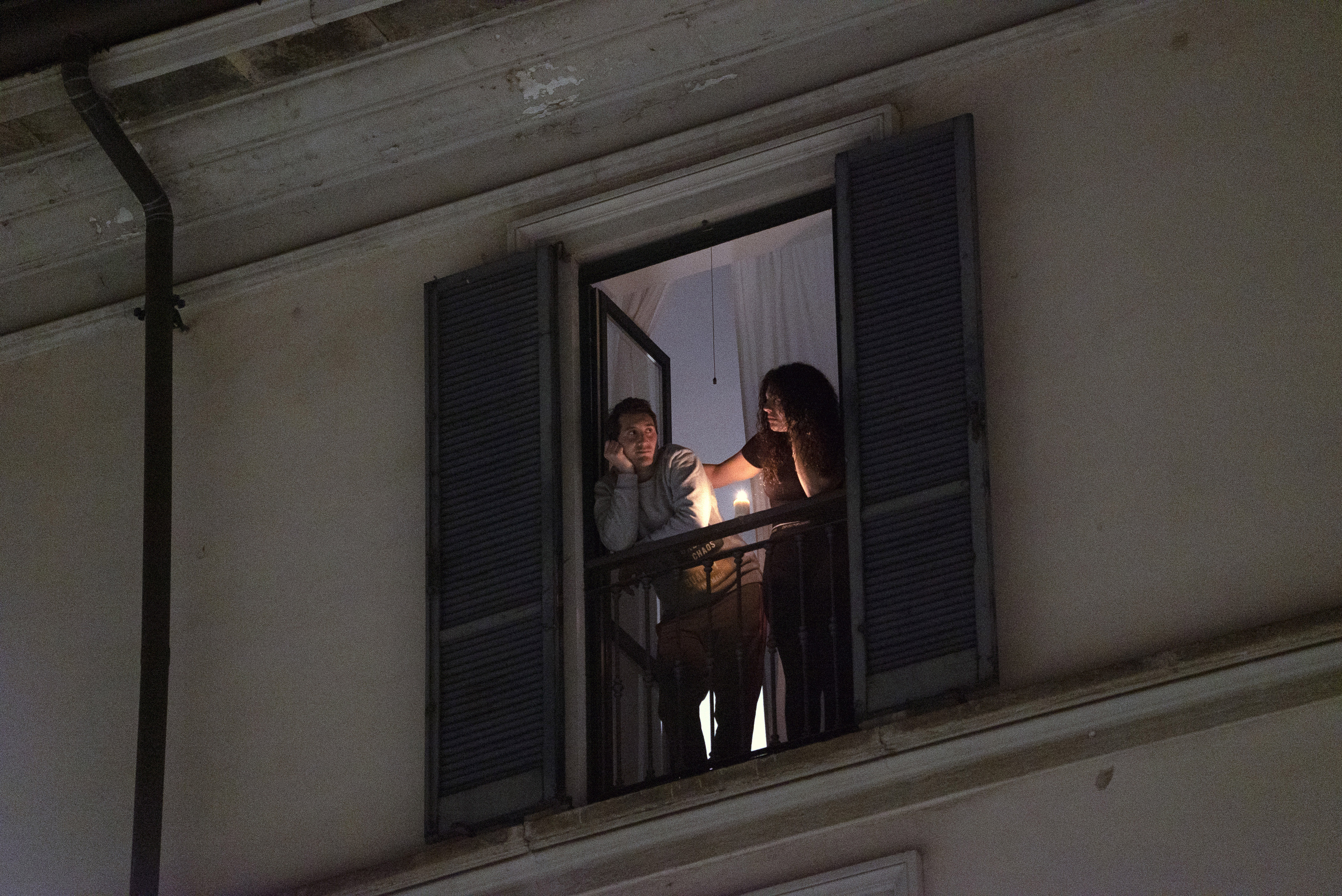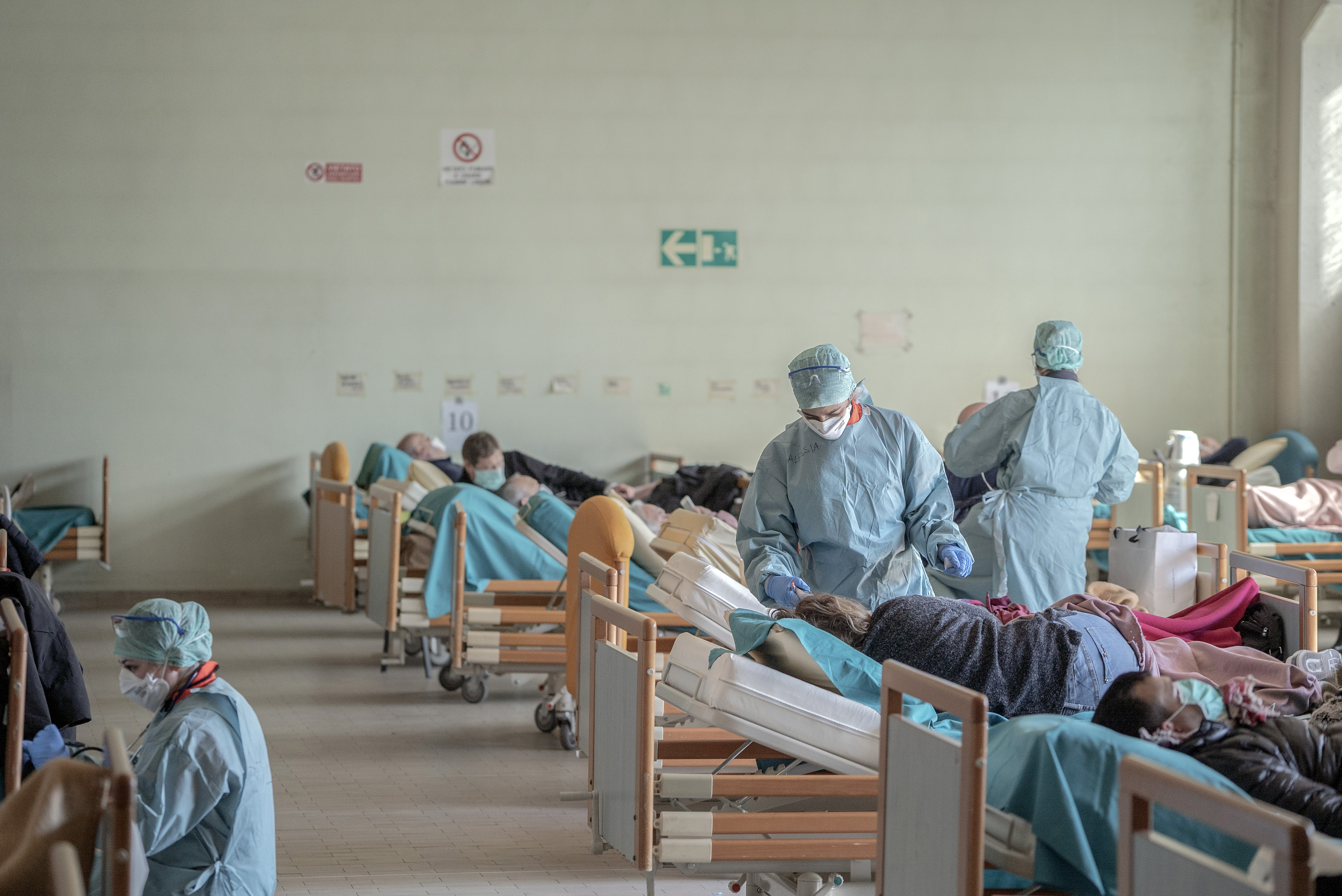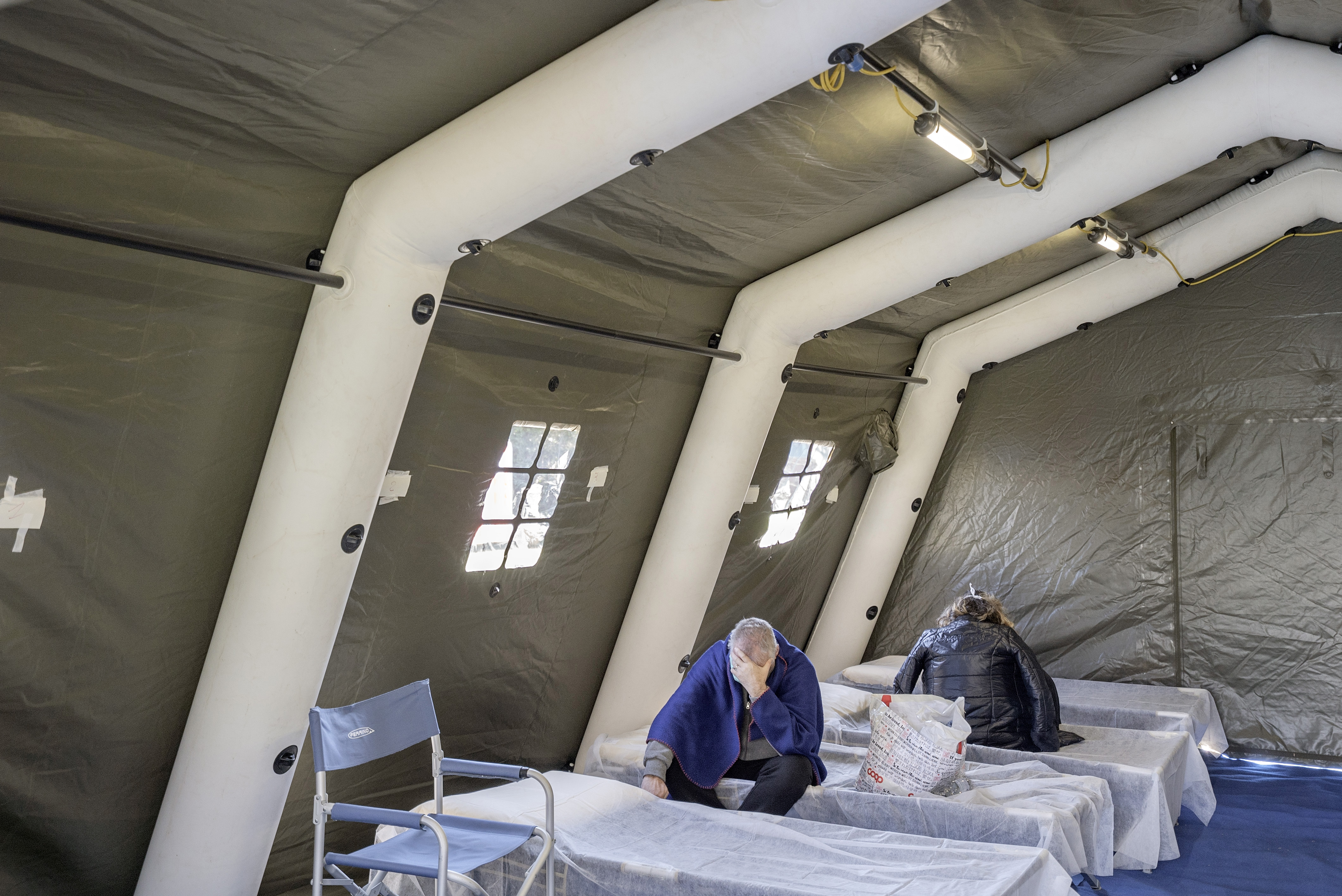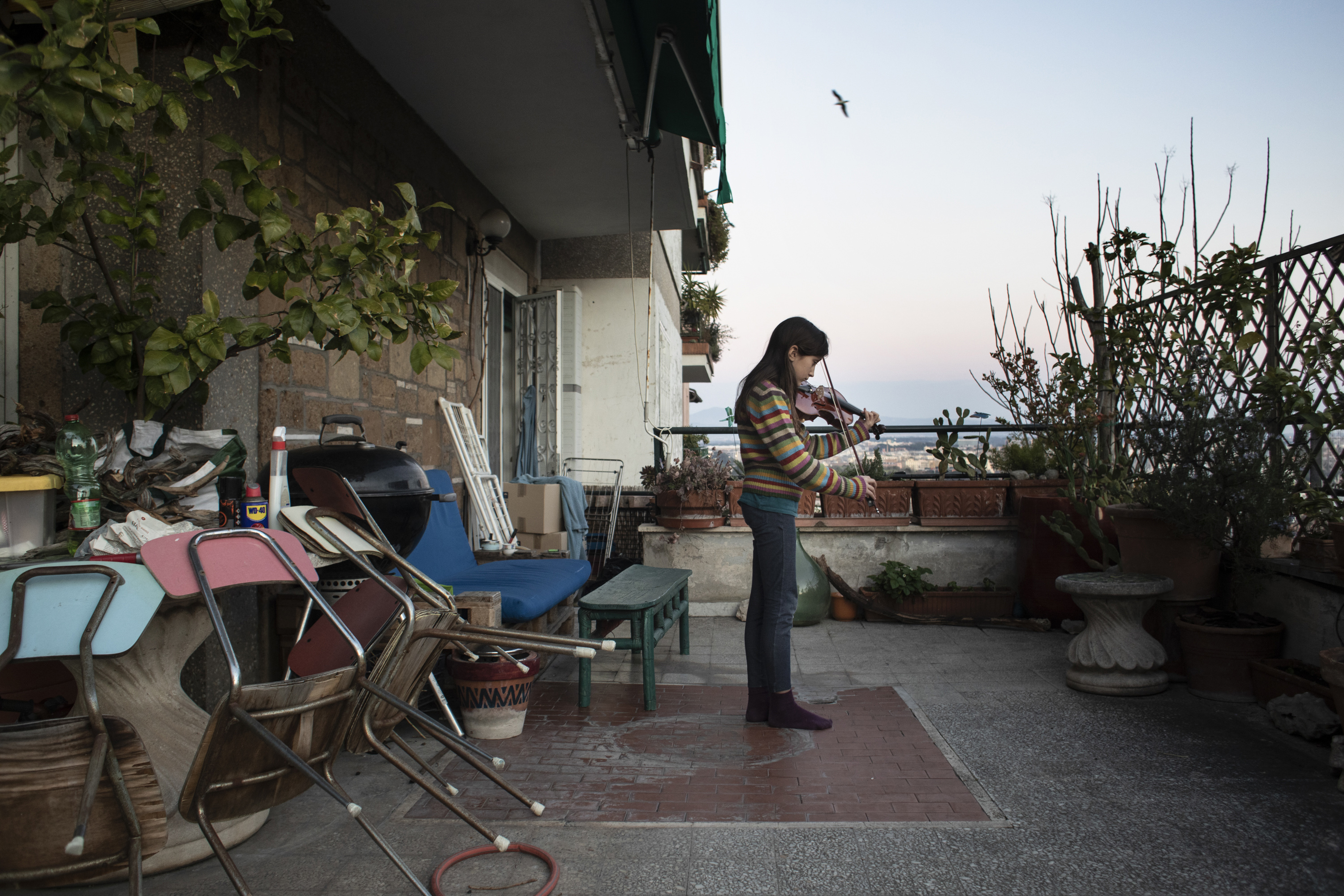Hospital morgues there are inundated. Bergamo’s mayor, Giorgio Gori, issued an ordinance that closed the local cemetery this week for the first time since World War II, though he guaranteed that its mortuary would still accept coffins. Many of them had been sent to the Church of All Saints in Bergamo, located in the closed cemetery, where scores of waxed wooden coffins form a macabre line for cremations.
“Unfortunately, we don’t know where to put them,” said Brother Marco Bergamelli, one of the priests at the church. He said that with hundreds dying each day, and with each body taking more than an hour to cremate, there was an awful backlog. “It takes time, and the dead are many.”
An emergency national law issued last week banned civil and religious ceremonies, including funerals, to prevent the spread of the virus. Officials have allowed priests to say a prayer at burials attended by just a few of the bereaved. In his brief prayers to family members, who often wore masks, Bergamelli said that he tried to give consolation and hope and urged people to be close, if permitted, to those who were alone. “This tragedy reminds us to love life,” he said.
In the nearby village of Zogno, the local priest has decided to ring the death knell just once a day, to keep from ringing it all day long. In another town, Casalpusterlengo, the Rev. Pierluigi Leva said believers were taking the “absence” of funerals especially hard.
Family members are spirited away and, because of the danger of contagion, often die in hospital isolation without any family or friends around. Local associations in the northern city of Brescia have started collecting donations of tablet devices to give to hospitals so that coronavirus patients can stay in touch — or say goodbye — to their families back home.
In some parts of southern Italy, where Roman Catholic traditions are particularly strong, the funeral rite has been too important for some to let go.
In the Sicilian town of Porto Empedocle, local authorities said that they had cited 48 mourners last week for taking part in a funeral procession in defiance of national restrictions. The mourners risk three months of jail.
The Rev. Leopoldo Argento, 59, a priest there, said: “Funerals are part of our anthropology.” He said he understood the impulse of the mourners to congregate but thought it was necessary to suspend the funerals. Normally, 600 to 1,000 people might attend. “In Sicily, the death of our loved ones is a very strong moment and a very important one in our social life,” he noted.
All of Italian social life has been transformed by the virus, most acutely in Lombardy.
Giacomo Grasselli, who is coordinating the intensive care unit response in Lombardy hospitals, attributed the high number of deaths in part to the advanced age of Italy’s population. The average age of death, he pointed out, was about 80.
He said medical workers were more frequently forced to decide whether or not to take invasive measures to assist the breathing of the very old and sick but that, for now, every patient had received care.
But, “This will not last forever,” he warned, adding that the capacity to extend care to everyone depended on whether the containment measures worked. He said he took encouragement from the steep drop in new infections in the original quarantined towns of the region. “It is the only way to survive this.”
Costantino Pesatori, mayor of Castiglione D’Adda, one of those formerly quarantined towns, said that 47 people had died there since Feb. 21, compared with about 50 in all of 2019. He said that despite some of his residents having received a diagnosis of pneumonia, hospital officials “sent them home without testing them for coronavirus.”
In Bergamo last week, when an ambulance arrived at Stefanelli’s apartment for her husband, both were in bed with fevers. Three nurses entered and took Testa to the hospital and left her. That was the last time she saw him. Four days later, he was dead.
She said that she hoped his body could be kept in the Bergamo church until she and her children were released from quarantine and able to attend a funeral. She said the thought of her husband being buried without her there or having to choose who could go was unbearable.
“How can you choose among family members? The children shouldn’t be there? The wife shouldn’t be there?” she said. “This is the bitterest part.”
Testa’s death notice appeared Friday in a local paper, L’Eco di Bergamo. The paper usually has a single page of death notices. On Friday there were 10 pages, and the rest was dedicated to the virus devastating Bergamo.
“For us, it’s a trauma, an emotional trauma,” said Alberto Ceresoli, who edits the paper. “These are people who die alone and who are buried alone. They didn’t have someone hold their hand, and the funerals have to be tiny, with a quick prayer from the priest. Many of the close relatives are in quarantine.”
Giorgio Valoti, mayor of nearby Cene, died last Friday. He was 70. His son, Alessandro, said that 90 people died the same day in Bergamo’s main hospital. The virus “is massacring this valley; every family is losing someone dear to them,” he said. “In Bergamo, so many bodies are piling up they don’t know what to do with them.”
In Fiobbio, a small village outside Bergamo, an ambulance came to collect Luca Carrara’s father, 86, on Saturday. On Sunday, another one came for his mother, 82. Carrara, 52, couldn’t visit them in hospital and stayed home in quarantine, where he has begun showing symptoms of the virus. On Tuesday, his parents died. Their bodies are held in the hospital morgue awaiting cremation.
“I am sorry that they are still there,” he said. “Still alone.”
Luca di Palma, 49, said his father, Vittorio, 79, died Wednesday night and that the funeral home he called told him that it had no space for the body. Instead, workers delivered to his house a coffin, some candles, a cross and a mortuary refrigerator so that he could lay his father out in the living room. He said nobody came to pay respects, out of fear of contagion, though his father had died before he could be confirmed as a coronavirus case, and doctors had refused to perform a post-mortem swab test.
On Saturday, di Palma followed a hearse carrying his father’s body to a cemetery in Bergamo, where a caretaker let them in and locked the gates behind. A priest arrived to offer a brief prayer over the hearse, its trunk lifted. Di Palma said his father wanted to be cremated, but the wait was long. “Painful,” he said.
In a country where many learn in school about the dreaded Monatti who, preceded by the ringing of a little bell, retrieved corpses on carts during the 17th-century Milan plague, the amassing of dead bodies seems out of another time.
Alessandro Bosi, secretary of the National Federation of Funeral Homes, said that the virus had also caught the mortuary industry by surprise, with those who handle the dead not having sufficient masks or gloves. While health authorities say they do not believe that the virus can be transmitted posthumously, Bosi said that a corpse’s lungs often released air when being moved.
“We have to consider them in the way we would treat infectious individuals, and take the same care,” he said.
“If we’re not the ones taking away the dead,” he added, “then they’d have to call in the army.”
At around midnight Wednesday, Renzo Carlo Testa, 85, died from the coronavirus in a hospital in the northern Italian town of Bergamo. Five days later, his body was still sitting in a coffin, one of scores lined head to toe in the church of the local cemetery, which is itself closed to the public.
His wife of 50 years, Franca Stefanelli, would like to give him a proper funeral. But traditional funeral services are illegal throughout Italy now, part of the national restrictions against gatherings and going out that have been put in place to try to stem the spread of Europe’s worst outbreak of the coronavirus. In any case, she and her sons could not attend anyway, because they are themselves sick and in quarantine.
“It’s a strange thing,” Stefanelli, 70, said, struggling to explain what she was going through. “It’s not anger. It’s impotence in the face of this virus.”
The coronavirus epidemic raging through Italy has already left streets empty and shops shuttered as 60 million Italians are essentially under house arrest. There are the exhausted doctors and nurses toiling day and night to keep people alive. There are children hanging drawings of rainbows from their windows and families singing from their balconies.
But the ultimate metric of pandemics and plagues is the bodies they leave behind. In Italy, with the oldest population in Europe, the toll has been heavy, with more than 2,100 deaths, the most outside of China. On Monday alone, more than 300 people died.
And the bodies are piling up in the northern region of Lombardy, especially in the province of Bergamo. With 3,760 total cases reported Monday, an increase of 344 cases from the day before, according to officials, it is at the center of the outbreak.

Residents look out from their balcony in Milan, March 15, 2020. Bodies are piling up in Italy as traditional funeral services are illegal throughout the country now, part of the national restrictions against gatherings and going out that have been put in place to try to stem the spread of Europe’s worst outbreak of the coronavirus. (Alessandro Grassani/The New York Times)

The laundry area of a hospital in Brescia, Italy, has been filled with beds for patients awaiting who are being tested for the coronavirus, Monday, March 16, 2020. (Alessandro Grassani/The New York Times)

Tents outside a hospital in Brescia, Italy, are setup to provide testing for the coronavirus on Monday, March 16, 2020. (Alessandro Grassani/The New York Times)

Iole Liguore, 11, plays the violin on her terrace in Rome, Sunday, March 15, 2020, in a show of solidarity during the caronavirus lockdown. She attends a school which has a special concentration for students in music. (Nadia Shira Cohen/The New York Times)











